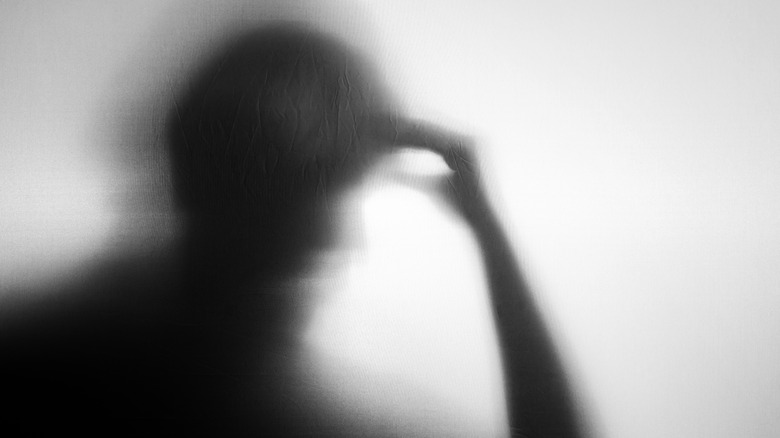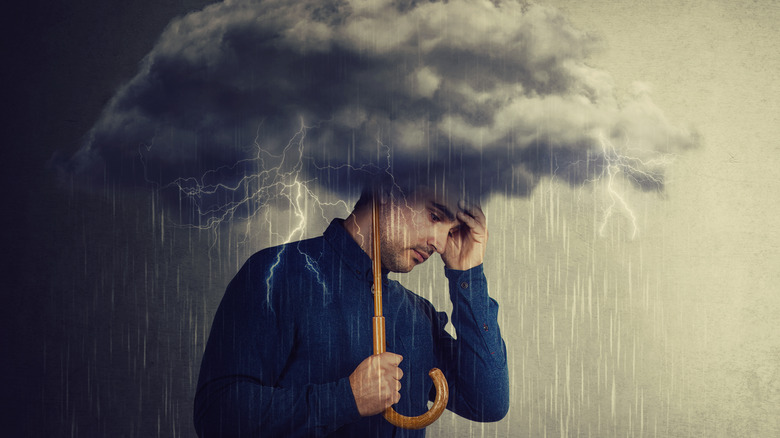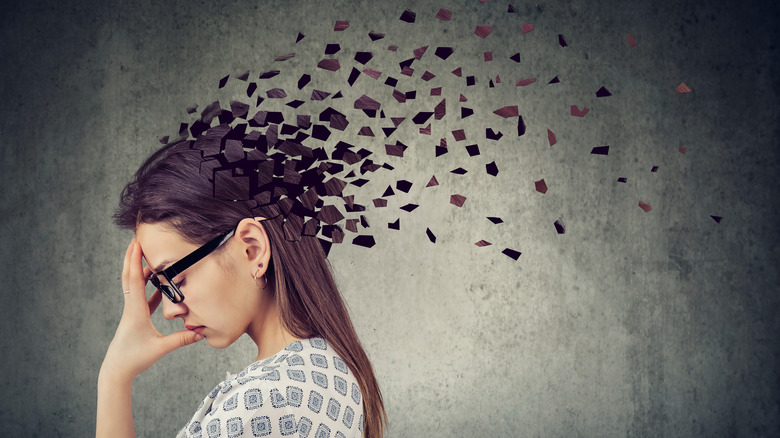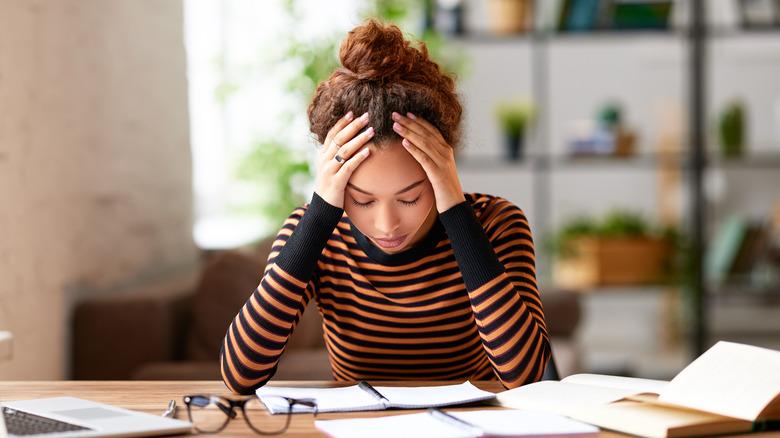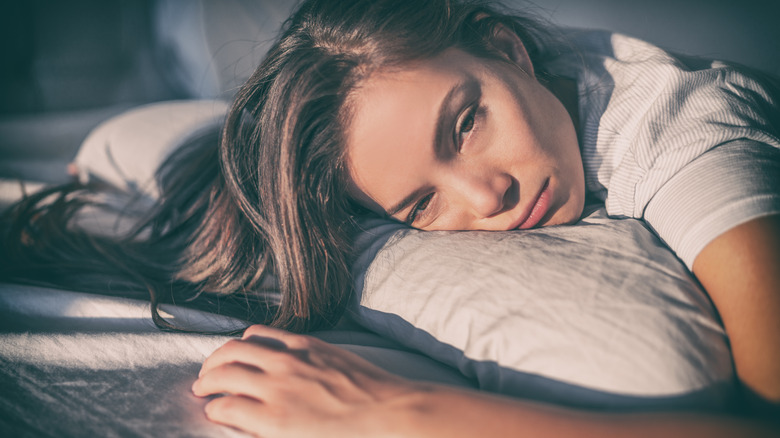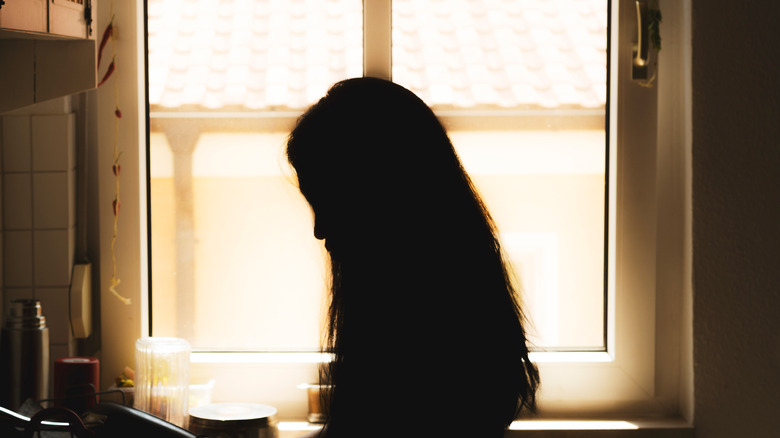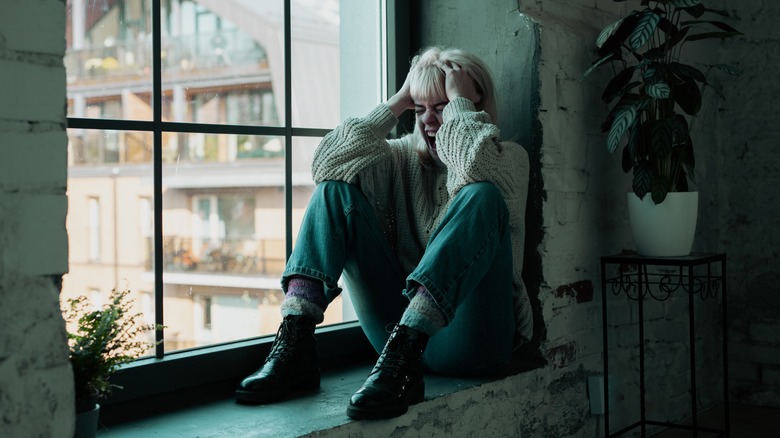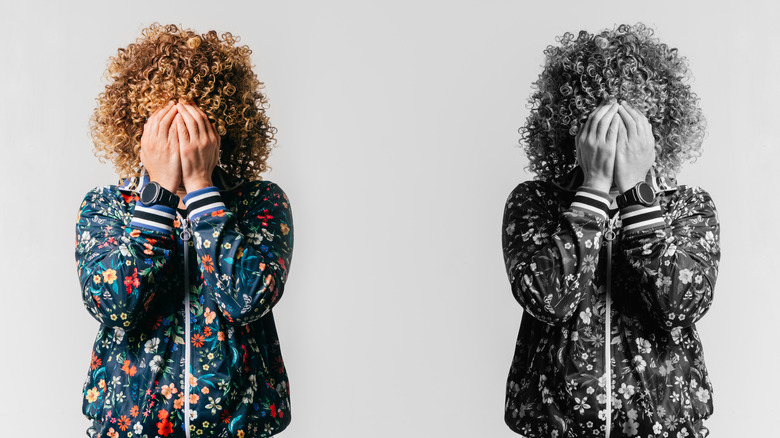You Might Have High-Functioning Depression If This Happens To You
When you think of depression, you may picture someone who has a hard time functioning in their day-to-day life. It's true that functional impairment can be a hallmark of depression (via Therapeutic Advances in Chronic Disease). But up to 7% of people with major depressive disorder (MDD) report going about their daily lives in a seemingly normal fashion. This might include going to work everyday, engaging in leisure and social activities, and forming and maintaining relationships.
"High-functioning depression" is not an official clinical diagnosis (via Everyday Health). The term is used colloquially to refer to individuals who are struggling with depressive symptoms, yet appear to be coping on the outside. It highlights the misconception that mental illness is easy to recognize and detect. Depression isn't always obvious – it can have many different faces as well as being invisible. Many people battle the illness for years without disclosing it and they may develop ways to hide what they're going through internally. Here are some of the key signs and symptoms that you might be dealing with high-functioning depression.
If you or someone you know is struggling with mental health, please contact the Crisis Text Line by texting HOME to 741741, call the National Alliance on Mental Illness helpline at 1-800-950-NAMI (6264), or visit the National Institute of Mental Health website.
You feel sad or hopeless most of the time
People with depression feel chronically sad or hopeless, notes the National Institute for Health Care and Excellence (NICE). You may find yourself excessively ruminating or crying for no apparent reason. A low mood and a loss of interest in doing things are two of the main symptoms of depression, and these tend to be consistent and steady over time. In order for an individual to be diagnosed with clinical depression, they must be feeling down most days for at least two weeks.
For some people, the painful emotions that hang over them can negatively impact how they handle daily activities each day, like going to work or keeping up with chores. But not everyone who has depression is functionally impaired, shows research (via Therapeutic Advances in Chronic Disease). Some people can continue attending to their responsibilities at work or at home; however, that doesn't mean that they're not struggling with intense emotions and suffering from a serious mental health problem with significant life consequences (via Everyday Health).
It takes more effort than usual to do things
Depression, as a psychiatric illness, exists on a spectrum (via NICE). This means that people with a diagnosis of depression can have very different experiences. The disorder can also look different from the outside: One individual might be lethargic, slow-moving, and unable to get out of bed most days, whereas another may appear to go about their lives as normal.
Something that people with clinical depression do tend to have in common is that things no longer feel as pleasurable or exciting as they once did (via Translational Psychiatry). Anhedonia, meaning "without pleasure" in Greek, is the inability or reduced ability to feel pleasure. It's one of the core symptoms of major depression, though it might not be as obvious in people with high-functioning depression. You may continue to participate in previously enjoyable activities and hobbies, but it might feel like hard work and it might not give you the same satisfaction it used to. Some people with depression report feeling like they're "acting," since the way their life appears to others doesn't pair up with how they feel on the inside (via HuffPost UK).
You have very little energy
Depression can be physically and emotionally draining (via HuffPost UK). Even if you're able to go through the physical motions each day and maintain and complete tasks, it can feel like you have very little fuel left in your tank. Perhaps you feel perpetually tired despite clocking in adequate sleep. Everything seems a lot more difficult when you're dealing with high-functioning depression.
A lack of energy might be partly due to the effects of anhedonia, which influences our internal reward systems, but it can also be attributed to fatigue. Research shows that fatigue is a commonly observed symptom in people with depression, and it often goes hand in hand with anhedonia. Symptoms of fatigue can affect physical, cognitive, and emotional wellbeing, including performance at work, friendships and family relationships, and daily lifestyle choices and habits.
"When struggling with depression and maintaining a fully scheduled life, life is hard, exhausting, and rarely does it feel fulfilling," Reya Kost, a licensed marriage and family therapist, told HuffPost UK.
You spend a lot of time worrying about things
A major component of depression is rumination (via NeuroImage). This involves dwelling on distressing situations like loss or rejection, usually in an unconstructive way. Many people with depression get stuck in a loop of pessimistic or unhelpful thinking, or they repetitively think about past or present events with regret. They may reenact mistakes or failures in their lives, which inevitably makes them feel worse about themselves. Some people find it hard to give tasks or conversations their full attention, since their mind is busy with persistent inner chatter.
Rumination can also cause you to judge neutral events negatively and focus on worst-case scenarios rather than seeing things objectively. For example, you might wrongly interpret a comment that someone makes as a criticism and convince yourself that it means something that it doesn't. If you're one of those people who is constantly worrying and catastrophizing but can still function in day-to-day life, you may find yourself doing things on autopilot rather than being actively engaged in your activities.
Rumination can be all-encompassing and hard to escape. Mindfulness meditation can provide some relief from repetitive negative thinking, notes a study from Frontiers in Psychology. Practicing mindfulness on a regular basis may help people with depression step out of the toxic cycle of rumination.
You notice changes in your appetite
You may notice subtle or dramatic changes in your eating patterns if you've been struggling with depression. Some people experience a sudden drop in appetite, while others find themselves overeating or obsessing about food, notes a study published in the American Journal of Psychiatry. It's common for people to gain or lose weight without trying to. Many of the brain regions involved in appetite regulation and food reward have also been associated with depression.
The disorder can affect people's appetite and eating habits for a number of different reasons. Many people with depression lose interest and pleasure in doing things they once enjoyed (via Behavioural Brain Research). This can include preparing or eating delicious foods or going out for meals with friends. Some people might skip meals because they feel too anxious to eat (via the American Journal of Psychiatry). There may be days where they barely eat anything at all, which can impact their energy levels and worsen their low mood. On the other hand, some individuals turn to food to dull or dampen uncomfortable emotions (via Frontiers in Psychology). Unsurprisingly, many "comfort foods" are high in sugar and fat, and consuming them can temporarily make people feel better, both psychologically and physiologically.
You keep forgetting things
A less obvious sign of depression is forgetfulness. Research has shown that the illness can lead to short-term memory problems, and the severity of this tends to vary among individuals. According to one study, people with depressive thoughts give more of their attention to mood-congruent information rather than prioritizing the processing of goal-relevant information (via Cognition and Emotion). This can cause day-to-day memory and concentration mishaps. Some people have a hard time remembering basic things like appointments, while others may frequently lose or misplace their belongings.
In fact, depression is known to underlie a host of cognitive deficits that contribute to poor memory, including attention, planning, organizing, problem solving, and response time (via European Psychiatry). Depression can slow down and hinder the brain's ability to shift from one task to another. It can also weaken the inhibition of reflexes, causing the brain to be less focused and more easily distracted.
It's hard to make a decision
Tasks and responsibilities can feel overwhelming for a person with depression. One of the reasons for this is that the illness causes decision-making functions to suffer, according to researchers (via Clinical Psychological Science).
Decision-making is an energy-consuming process. It involves estimating the probability and value of potential outcomes, as well as the amount of effort that certain courses of action will take. However, people with depression typically experience anhedonia. This makes them lack the motivation to put in the cognitive effort that's involved in decision-making, since the outcomes of their actions might not seem as interesting or appealing as they previously did.
People with depression have a hard time putting their cognitive abilities to work. But avoidance of cognitive effort then further exacerbates their cognitive and functional difficulties. It's no surprise that people with depression tend to spend more days in bed and are less able to carry out work, household, or social obligations compared with their peers without depression. And for those who are still able to function, everything in life can feel that much more daunting and arduous.
Your sleep is out of whack
Most people with depression experience sleep disturbances at some point in their lives (via the Journal of Psychiatric Research). Some people have trouble falling or staying asleep, while others may find themselves sleeping more than normal. At the same time, sleep problems can make depressive symptoms worse, setting off a relentless cycle that's hard to escape.
Some researchers have suggested that ghrelin might be the culprit behind both depression and sleep issues, since high levels of ghrelin tend to be more common in people with mood disorders (via the World Journal of Experimental Medicine). A study of depressed postmenopausal women found that the higher the ghrelin levels, the more severe the patient's symptoms were (via Scientific Reports). Ghrelin is thought to help people get better quantity and quality of sleep by normalizing circadian rhythms. It also helps stimulate hunger and signals the brain when it's time to eat, in addition to being involved in reward and motivation pathways; this might explain why people with depression often experience notable changes in appetite (via the World Journal of Experimental Medicine).
You find yourself engaging in behaviors you wouldn't normally, like taking drugs
Depression is common among people who are addicted to drugs or alcohol (via Psycom.net). Substance abuse can lead to various problems like social isolation, physical illness, and feelings of worthlessness. Equally, depression can serve as a gateway to different forms of addiction. It's estimated that 18% of people with major depression also have a drug addiction and 16.5% have an alcohol problem.
A 2020 study investigating the rise in mental illness during the first year of the pandemic found that people with higher levels of depression and depressive symptoms were more likely to start abusing drugs or alcohol than others (via Centers for Disease Control and Prevention). There's evidence that depressed people are also more likely to start using cannabis or increase their existing use of it (via Cannabinoids and Neuropsychiatric Disorders).
Substance abuse can stem from various factors. People may turn to drugs or alcohol in an attempt to self-medicate and numb their emotional pain, or as a form of self-harm (via Psycom.net). If you're depending on drugs to stabilize your mood or engaging in reckless behaviors to help you cope, it's recommended that you reach out to a professional or friend for support.
If you or anyone you know is struggling with addiction issues, help is available. Visit the Substance Abuse and Mental Health Services Administration website or contact SAMHSA's National Helpline at 1-800-662-HELP (4357).
You experience frequent bouts of anger or irritability
Anger is a fairly common emotion among people with depression (via the Journal of Affective Disorders). They may feel angry at themselves, the people around them, or things they can't control like events from the past. At times, these feelings may occur from out of the blue and become difficult to contain. Anger can escalate or erupt into aggressive outbursts, also known as "anger attacks," which can start to affect an individual's professional or personal life.
People with high-functioning depression may start to become overly critical of everything and everyone, including themselves. "You think that you are a loser, your boss is an idiot, your partner is the most annoying person who ever lived, and life is simply unbearable," psychologist Valeria Skopich told HuffPost UK, adding: "There are negative thoughts spinning in your head that you just can't turn off." This critical inner voice might be the result of inwardly turned anger, which tends to add fuel to the fire, bringing up feelings of low self-worth and shame.
You would rather be alone than in social gatherings
People struggling with high-functioning depression can easily go under the radar, especially if they're still able to meet up with friends and attend to social activities. But being physically present in social situations doesn't always mean that it's easy for them to show up. Some people with high-functioning depression can even find it hard to say "hi" to people they know, and it's not uncommon for them to "flake" or cancel plans (via HuffPost UK).
Social functioning –- namely, a person's capacity to function in different social roles -– is often compromised by depression, reports a 2022 study (via European Archives of Psychiatry and Clinical Neuroscience). Social interactions can feel taxing and difficult to sustain. Some people find it hard to express themselves and become highly sensitive to rejection and criticism from others. They also tend to interpret things in a negative way. The extent to which a person might struggle socially usually depends on the severity of their symptoms. On the whole, people with depression spend more time alone and less time socializing or being among friends (via Scientific Reports). They also tend to hang out with other similarly depressed individuals.
You feel bad about yourself most days
Self-esteem is defined as the way we judge and value ourselves, and the ability to maintain positive self-beliefs even when faced with significant challenges. Low self-esteem is strongly connected to depression, according to research (via Child and Adolescent Psychiatry and Mental Health). People with low levels of self-esteem often report depressive symptoms, and vice versa.
Even people who seem to be keeping it together and achieving their goals might generally feel bad about themselves in most areas of life (via HuffPost UK). This is because depression is usually accompanied by negative self-talk and commentary. This critical inner voice isn't just about other people and the world around us –- it can often be directed at ourselves, kicking us when we're already down.
"You can constantly doubt whether you are on the right path in your career, whether you are in the right relationship, what you are doing with your life and even if you can cope with being an adult," psychologist Valeria Skopich told HuffPost UK. Low self-esteem magnifies and heightens the sadness and helplessness we usually feel when we're depressed.
You have suicidal thoughts
The suicide of former Miss USA Cheslie Kryst in January 2022 shone a light on the potential dangers of high-functioning depression. It served as an unfortunate reminder that not everyone who goes on to harm themselves will show warning signs. Many people who are emotionally suffering do not seek support, let alone receive treatment for their illness.
A 2020 study revealed an increase in levels of suicidal ideation among people with depressive symptoms during the COVID-19 pandemic (via Centers for Disease Control and Prevention). Numerous studies have shown that depression can lead to feelings of hopelessness and subsequent suicidal thoughts and behaviours, elevating a person's risk of dying by suicide (via Frontiers in Psychiatry). Not everyone who thinks about suicide is going to harm themselves, but if you're experiencing these kinds of thoughts, it's important to reach out for support. Suicidal ideation, whether passive or active, can have pretty serious consequences over time and shouldn't be swept under the rug.
If you or anyone you know is having suicidal thoughts, please call the National Suicide Prevention Lifeline at 1-800-273-TALK (8255).

